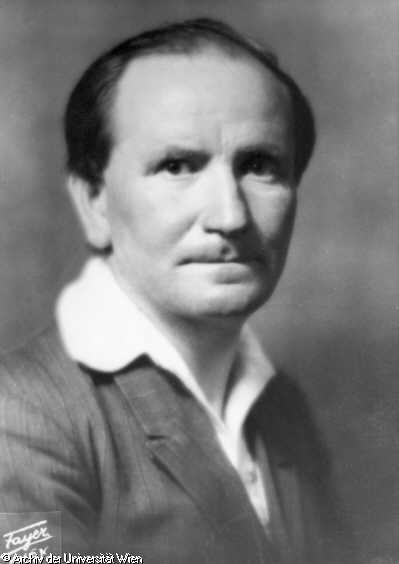Oskar Ewald (geb. Friedländer)
| Born: |
09-02-1881 |
| Faculty: |
Philosophical School |
| Category: |
Expelled teacher |
Oskar EWALD (nee FRIEDLAENDER) (born on September 2
nd, 1881 in St. Georgen, died on September 25
th, 1940 in Oxford/Great Britain) was privat lecturer ("Privatdozent") for philosophy (theoretical philosophy) at the Philosophical School of the University of Vienna in 1938.
He was persecuted in times of Nazism because of his political orientation lost his position and was thrown out of the university in 1938.
Ewald, whose father was a philosopher and religion teacher as well as secretary of the "Alliance Israélite Universelle" and the "Baron Hirsch Fund", attended Franz Josef secondary school in Vienna, where he graduated in 1899. He then studied history and philosophy at the philosophical faculty of the University of Vienna and obtained his doctorate in 1903 with the dissertation "Immanenz und Relativismus".
[1] Six years later he habilitated. Ewald served from 1914 to 1918 in the First World War as an officer of the Austro-Hungarian army.
Besides his work at the University of Vienna, where he began teaching in 1921, he also held courses at the Viennese adult education center. In 1926 he was substantially involved in the founding of the "Bund der Religioesen Sozialisten" (League of Religious Socialists, BSR), while also maintaining close contact to religious socialists in Switzerland, such as Leonhard Ragaz. Ewald also contributed to their journal "Neue Wege", as well as to its Austrian counterpart "Menschheitskaempfer". His political commitment can furthermore be seen in his organization of two conferences concerning Christianity and Socialism in 1928 and 1929 in Vienna. In 1937 he traveled to Estonia and the Lutheran bishop Rohamaegi.
[2]
After the "Anschluss", as of April 22
nd, 1938, the Austrian ministry of education rescinded his teaching license at the University of Vienna.
[3] The main reasons for this were not only his political activities, but above all also his Jewish descent. In the same year the National Socialists deported him to Dachau, where he was imprisoned until 1939, when he was released thanks to an intervention by the Swiss physicist and author Alexander von Muralt. Ewald returned to Vienna and after expulsion orders fled through Switzerland to Great Britain. A year later he passed away in Oxford.
Among his most famous works are "Kants Methodologie in ihren Grundzuegen" (1906), "Die Erweckung: Selbsterkenntnis und Weltgestaltung" (1922), as well as "Die Religion des Lebens" (1925).
[4]
In 1971, the Ewaldgasse in Vienna’s 11
th district was named after him.
Lit.: Archive of the University of Vienna/PH PA 467, PHIL GZ 659 ex 1937/38; MUEHLBERGER 1993, 40; ROEDER Vol. 2 1983.
[1] UA, PA, fol. 31, Curriculum vitae, o. D.
[3] UA, PHIL GZ 659-1937/38, O.-Nr. 68, PHIL Dekanat an Ewald, 23.
Andreas Huber (translated by Thomas Rennert)
